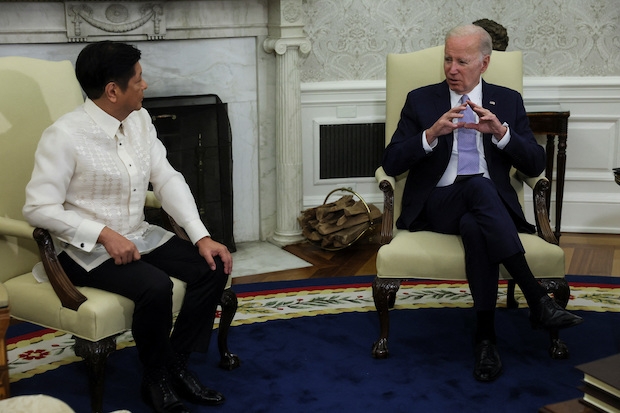
US President Joe Biden holds a bilateral meeting with Philippine President Ferdinand Marcos Jr. in the Oval Office at the White House in Washington, US, May 1, 2023. (Photo by LEAH MILLIS / Reuters)
WASHINGTON — US President Joe Biden and Philippine President Ferdinand Marcos Jr. will agree on Monday to new guidelines for stronger military cooperation, US officials said, underscoring a dramatic turnaround in US-Philippine relations over the past year.
The guidelines focus on military coordination across land, sea, air, space, and cyberspace, while the US administration will also transfer three C-130 aircraft and look to send additional patrol vessels to the Philippines.
Biden will also reaffirm a 1951 Mutual Defense Treaty that calls for the United States to act in the event of an armed attack on the Philippine military, the officials said in a briefing call for reporters.
The summit is the centerpiece of a four-day US visit by Marcos that started on Sunday, the first by a Philippine president in more than 10 years.
Marcos became president last year and has sought warm relations with both the United States and China, who are vying for influence in the Asia-Pacific region.
Under Rodrigo Duterte, Marcos’ predecessor, US relations soured as he turned the Philippines sharply away from its former colonial ruler and built closer ties with China.
But with many Filipinos frustrated by China’s actions in the South China Sea, including the harassing of Philippine ships and fishermen in parts of the sea that both countries claim, popular support has grown for a tougher stance toward Beijing.
Wariness about China has only increased recently.
A reported comment last month by Beijing’s ambassador to Manila that the Philippines should not support Taiwan’s independence “if you care about the 150,000 overseas foreign workers” of Filipino origin who live there was viewed as a “veiled threat,” a US official said.
“Some of the steps that China have taken have concerned [Marcos], probably even surprised him,” said one senior Biden administration official. “He has strong desire to work closely with both countries but finds himself in a situation that the steps that China’s taking are deeply concerning.”
“We will reaffirm our commitment to fostering our long-standing alliance as an instrument of peace and as catalyst of development in the Asia-Pacific region,” Marcos said before leaving for the trip on Sunday.
He later told reporters on his plane China had agreed to discuss fishing rights in the South China Sea and also that he would not allow the Philippines to become a “staging post” for military action.
Philippines central to US plans
Washington sees the Philippines as key to any effort to counter an invasion of Taiwan by China, which claims the island as its own territory.
Manila recently agreed to allow the United States access to four more of its military bases under an Enhanced Defense Cooperation Agreement, but the two sides have not said what US assets will be stationed at those.
Experts say Washington considers the Philippines a potential location for rockets, missiles, and artillery systems to counter a Chinese amphibious assault on Taiwan.
Biden has invested in courting Marcos, who still faces a US court judgment connected with $2 billion of plundered wealth under his father’s rule.
Washington helped Marcos’ father flee into exile in Hawaii during a 1986 “people power” uprising and as head of state his son is immune from US prosecution.
Biden was the first official to reach out to Marcos after his election and has made strengthening economic and military ties in the Indo-Pacific region a cornerstone of his foreign policy.
Ahead of the summit, US Democratic Representatives Jan Schakowsky and Rosa DeLauro led 13 US lawmakers in a bipartisan letter to Biden calling on him to raise what they called the worsening human rights “crisis” in the Philippines.
In a statement, they said there were well-documented violations under Duterte but recent reports showed “ongoing impunity.” They cited reports from the Karapatan Human Rights Alliance of 17 extrajudicial killings, 165 illegal arrests from July to December 2022, and a total of 825 political prisoners.
The exact contours of a US-Philippine alliance in a wartime scenario remain sketchy, including the level of access and cooperation at Philippine bases.
The new Philippines bases the US gained access to last month include three facing Taiwan and one near the disputed Spratly Islands in the South China Sea. China said this was “stoking the fire” of regional tensions and Washington should take no role in a conflict far away from its shores.
Biden will also take economic cooperation steps, including sending a trade and investment mission to Manila, supporting the rollout of 5G telecommunications technology, launching public-private financing for critical minerals and “smart” power grid development, new bilateral discussion on labor issues, and support for airport security, maritime safety and the Philippines’ healthcare industry.
The Marcos visit is part of stepped-up US Indo-Pacific diplomacy.
Biden hosted South Korea’s president last week and heads to Japan this month for the Group of 7 meeting and to Australia for a Quad summit with leaders of Japan, India, and Australia. Both meetings are expected to focus heavily on China.

